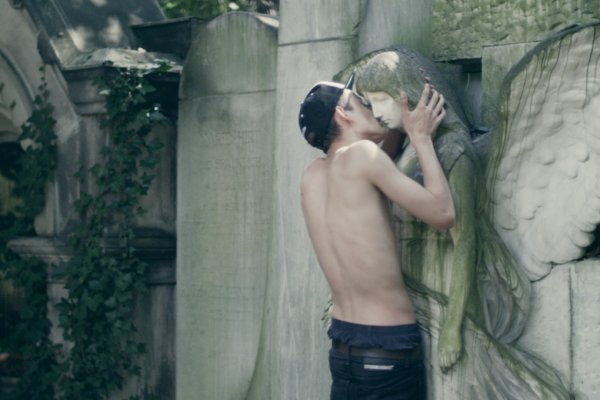American photographer and filmmaker Matt Lambert is at the center of a cultural shift, devoted to exposing truths and opening minds, particularly in the field of sexuality and relationships.
After cementing his reputation with commercial work, he has found his true calling, perhaps currently best represented by the series of short films he did for Dazed Magazine’s online portal as one of their “Visionaries.”These unflinching, but sensitive portrayals allow the viewer to peer inside the vulnerabilities of sex and attraction — a difficult world to navigate at the best of times, much less as part of any alternative life narratives. The straightforward, non-sensationalized approach reveals the relatable humanity of his subjects. Judging by his next commission, with a major television network, it’s safe to call his work a success. We caught up with him via email, between his endless producer meetings, to get the bigger picture.
Of the various activities you do, which part of your work speaks the most directly to your own interests, or represents you the best?
It’s all a reflection of my life and interests. My short film work is what I love most, but it’s also fueled by the brief encounters of quick and casual photoshoots/conversations with friends and acquaintances. A lot of this [short film] series started with intimate snapshots with my boyfriend (now husband) and friends at after-parties around Berlin.
I had come from such a formal place with the work I was doing in New York that I didn’t put a lot of thought into it. There was a division between my commercial film work and my personal work. It finally got interesting when I erased those lines. The work started to become semi-autobiographical and therefore I naturally connected to it on a much more emotional level.
My photo work began to inform my film work and became part of an ecosystem. For example, one of my ongoing photo projects has been shooting male escorts in Berlin. I’ve become friends with quite a few, and some became the focus of short docudrama film pieces. Others have made cameos in other longer form film projects.
Aesthetically, I came from a world of punk rock and my early imagery was primarily black and white and heavy-handed. There was a violence to these images. As I started to become more comfortable in my own skin and fall deeper in love with humanity, my images opened up and became softer, lighter, warmer and more sensual.It seems like a lot of your work, especially the short films, deal with a specific topic and theme. Can you explain that for us?
The most recent stage of my filmmaking and visual art career has stemmed from a selfish curiosity to revisit, deconstruct and redefine my youth. However, as my exposure and niche audience has started to grow, I’ve started to frequently receive messages from people telling me how my work has helped them to define their own struggles with identity and sexuality. This open dialogue with those coming of age has me wanting to continue exploring themes of youth, love, sex, relationships and identity in hopes of continuing this change in people.
"It becomes much more difficult to demonize when you hear someone's story or look into their eyes." Matt LamberWhen people are reduced to stereotypes, it‘s so easy to minimize their experiences. However, it becomes much more difficult to demonize when you hear someone’s story or look into their eyes. I aim to present my characters with an intimacy that precedes their sexual orientations. Acceptance and tolerance of LOVE as a concept and reducing the FEAR of the unknown can allow for the evolution of how people look at others.
As a filmmaker, what are your goals for any given work?
They are always changing. For now, my biggest hope is that the work resonates with young people (even if just a small percentage), and allows them to evolve the way they look at themselves and those around them. Love and tolerance are usually a vital subtext in recent work.
You‘re now in a position where people outside of your own community are noticing your work. How do you think that will change what you do?
It hasn’t really changed what I do, but rather helps redefine what’s seen as obscene as it starts to permeate the mainstream. A big hope would be that it opens up a few more minds and shifts the current cultural stance on sexuality and intimacy. So many people (especially in the United States) are afraid of their own inner-core and this inhibits so many others from existing how they naturally should.
It’s been noted that you will have your television debut in 2015 on a major network. Can you tell us anything more about this project?
All I can say is that I’m developing, writing and directing a TV series for a major US network surrounding the themes of youth, love, sex and relationships taking place in multiple cities around the world.








